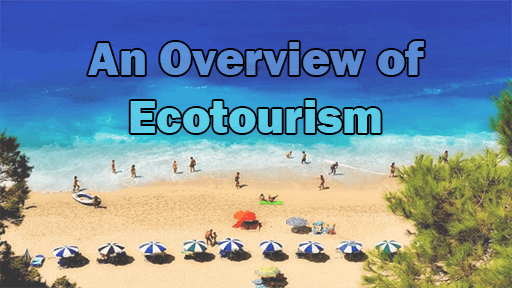An Overview of Ecotourism:
Ecotourism is a form of travel focused on exploring natural areas to gain knowledge. It is based on the idea of visiting and experiencing the natural world, promoting conservation, sustainability and preserving natural environments. The primary aim of ecotourism is to enlighten travelers, fostering a deeper appreciation and understanding of the environment. It offers a vacationing or visiting approach that prioritizes natural features while minimizing environmental impact. This form of tourism provides a positive experience for both tourists and local communities. In the rest of this article, we will explore an overview of ecotourism; including definition, principles, importance, types, advantages, disadvantages and examples.
Definition of Ecotourism:
Ecotourism is defined as “responsible travel to natural areas that conserves the environment, sustains the wellbeing of local people and involves interpretation and education” (International Ecotourism Society, 2015).
Ecotourism is “a sustainable form of tourism that involves responsible travel to natural areas, aimed at conserving the environment, respecting local cultures, and promoting environmental education” (Smith, 2018).
Dr. Rodriguez (2020) defines ecotourism as “an ethical travel approach that seeks to minimize the negative impact on ecosystems, empower local communities, and educate visitors about the importance of environmental preservation”.
The Environmentalist Magazine (2019) describes ecotourism as “a travel philosophy that emphasizes the harmonious coexistence of tourism and nature, emphasizing low-impact activities, wildlife conservation, and community engagement”.
The Travel Research Institute characterizes ecotourism as “a conscious effort to immerse oneself in natural environments, fostering a sense of responsibility towards ecological conservation and cultural appreciation” (TRI, 2021).
Professor Chen (2017) offers the perspective that ecotourism is “more than a leisure activity; it is an educational journey that encourages travelers to become ambassadors for the protection of biodiversity and sustainable development”.
Principles of Ecotourism:
Ecotourism, as a responsible and sustainable form of travel, is guided by a set of principles aimed at preserving natural environments, respecting local cultures, and promoting environmental education. Here are key principles that underpin ecotourism:
1. Conservation Education: Ecotourism places a strong emphasis on educating tourists about the importance of conservation. This involves providing information and immersive experiences that deepen the understanding of local ecosystems, wildlife, and the delicate balance of nature. By fostering awareness, ecotourism aims to instill a sense of responsibility among travelers towards protecting and preserving the natural world.
2. Minimizing Environmental and Cultural Impact: A core principle of ecotourism is to minimize the impact on both the environment and local cultures. This involves careful planning and execution of tourism activities to prevent disruption or harm to the natural surroundings and the communities residing in these areas. By adopting responsible practices, ecotourism strives to ensure that the places visited remain untouched and culturally intact for future generations.
3. Ecological and Social Research: Ecotourism is grounded in thorough ecological and social research. This principle entails conducting detailed studies to establish baseline information about the ecosystems and the communities involved. Long-term monitoring programs are then implemented to track the impact of tourism activities, allowing for informed decision-making that aligns with conservation goals and community well-being.
4. Involvement of Local Communities: Recognizing the significance of local communities, ecotourism actively involves them in the decision-making processes. This principle ensures that the voices and needs of local residents are considered and prioritized. By engaging accountable local authorities, ecotourism aims to create a symbiotic relationship where both tourists and local communities benefit from the sustainable management of natural resources.
5. Tourism Zoning and Management: Effective planning through tourism zoning and management is crucial for ecotourism destinations. This principle advocates for the creation of plans that allocate specific zones for tourism activities while safeguarding untouched natural areas. By setting guidelines for visitor numbers and activities, ecotourism seeks to strike a balance between the enjoyment of visitors and the preservation of the environment and cultural heritage.
6. Ecosystem Preservation: Ecotourism prioritizes the preservation of ecosystems and protected zones. Profits generated from ecotourism activities are reinvested in conservation efforts, ensuring the sustained health of the natural environment. This principle aims to create a direct link between the economic benefits derived from tourism and the ongoing preservation and protection of the diverse ecosystems that make these destinations unique.
7. Sustainable Tourism Development: Sustainable tourism development is a key principle in ecotourism. It involves careful planning to ensure that the growth of tourism aligns with the capacity of the environment and local communities. By setting limits on visitor numbers and regulating activities, ecotourism seeks to prevent over-exploitation and ensure a harmonious relationship between tourism and the natural and cultural assets of a destination.
8. Economic Benefits for Local Communities: Central to ecotourism is the principle of enhancing economic benefits for local communities. This involves creating opportunities for local businesses, guiding services, and cultural presentations. By directing financial gains towards the community, ecotourism contributes to the economic empowerment of those living in proximity to natural and protected areas, fostering a sense of ownership and pride.
9. Community Empowerment and Involvement: Ecotourism promotes community empowerment by actively involving local residents in various aspects of tourism. From guiding nature walks to showcasing cultural practices, this principle ensures that communities become integral parts of the tourism experience. By valuing and incorporating local knowledge, ecotourism not only enriches the visitor experience but also strengthens the connection between tourists and the communities they visit.
1o. Environmentally Friendly Infrastructure: The principle of environmentally friendly infrastructure underscores the importance of minimizing the environmental footprint of tourism operations. This includes adopting eco-friendly practices in accommodation, energy use, waste management, and transportation. By embracing sustainable technologies and practices, ecotourism seeks to reduce the negative impact of tourism on the environment while preserving local plants, wildlife, and cultural heritage.
Importance of Ecotourism:
Ecotourism holds immense importance in the contemporary world, contributing to various facets of environmental, social, and economic well-being. Some of the importance of ecotourism are given below;
1. Economic Benefits to Local Communities: Ecotourism serves as a significant source of economic empowerment for local communities. By attracting visitors to natural areas, it creates job opportunities and supports small businesses. The revenue generated helps in reducing poverty, fostering sustainable development, and enhancing the overall socio-economic fabric of localities.
2. Sustainability for the Cultural Industry: Unlike conventional tourism, which may inadvertently erode cultural identities, ecotourism emphasizes sustainability for the cultural industry. By respecting and preserving local traditions and practices, ecotourism ensures that cultural heritage remains intact. This approach not only safeguards diverse cultures but also enriches the travel experience for visitors.
3. Conservation of Natural Areas and Biodiversity: One of the primary goals of ecotourism is the conservation of natural areas and biodiversity. By providing economic incentives to local communities for responsible resource management, ecotourism acts as a deterrent to destructive practices like mining or logging. This approach contributes significantly to preserving ecosystems and protecting the diverse species that inhabit them.
4. Educating Tourists about the Environment: Ecotourism serves as a powerful educational tool, offering visitors firsthand experiences in natural environments. Through guided tours and interactive programs, tourists gain insights into the intricacies of ecosystems, wildlife conservation, and sustainable practices. This education not only fosters a deeper connection with nature but also inspires environmentally conscious behavior.
5. Promoting Cultural Exchange: The promotion of cultural exchange is a hallmark of ecotourism. By encouraging interaction between tourists and local communities, ecotourism facilitates mutual understanding and respect. Visitors have the opportunity to immerse themselves in local traditions, fostering appreciation for cultural diversity. This exchange creates a positive and enriching experience for both tourists and host communities.
6. Environmental Awareness and Conservation Initiatives: Ecotourism plays a pivotal role in raising environmental awareness. Tourists, exposed to the beauty and fragility of natural habitats, become ambassadors for conservation. The revenue generated from ecotourism often funds conservation initiatives, supporting the establishment and management of protected areas, wildlife reserves, and biodiversity conservation projects.
7. Source of Awareness and Education: As a source of education, ecotourism contributes to the awareness of environmental issues and the importance of conservation. Visitors, equipped with knowledge about sustainable practices, are more likely to integrate environmentally friendly habits into their daily lives. This increased awareness creates a ripple effect, influencing broader societal attitudes toward conservation.
8. Economic Growth in the Ecotourism Industry: The global tourism landscape has witnessed the growth of distinct travel categories, with ecotourism emerging as a significant industry. The popularity of ecotourism contributes to economic growth on a global scale. This growth, in turn, leads to the creation of jobs, the development of sustainable infrastructure, and the economic upliftment of regions with ecotourism potential.
9. Support for Conservation Trends: Companies focusing on ecotourism actively contribute to conservation efforts. By promoting and offering ecotourism products and services, these companies educate tourists about the drawbacks of less sustainable forms of tourism. This support aids conservation initiatives and aligns with the growing global trend toward environmentally conscious travel.
10. Positive Impact on Social Life: Ecotourism positively influences social life by giving back to the community. Ecotourism businesses often provide training in practical skills to locals, creating opportunities for employment and skill development. Tourists, through their visits, can also share knowledge and skills, contributing to the diversification of the local economy and promoting sustainable practices.
11. Financial Resources for Sustainable Development: The ecotourism sector has the potential to generate significant financial resources. These resources can be harnessed for sustainable development goals, such as poverty alleviation, infrastructure development, and the provision of essential technology and resources to underdeveloped areas. Ecotourism becomes a catalyst for holistic and sustainable economic practices.
Different Types of Ecotourism:
1. Agrotourism: Agrotourism invites participants to delve into rural agricultural activities, fostering a connection between tourists and the agricultural landscape. Visitors engage with farms, learn about sustainable farming practices, and often partake in hands-on activities like harvesting or animal care. The essence of agrotourism lies in promoting understanding and support for local farmers.
2. Hiking Ecotourism: Hiking ecotourism provides a journey through natural landscapes on foot, offering a close encounter with the environment. Participants traverse trails in forests, mountains, or other scenic terrains, emphasizing low-impact travel. This form of ecotourism encourages physical activity, a profound connection with nature, and a heightened sense of environmental appreciation.
3. Camping Ecotourism: Camping ecotourism involves overnight stays in natural settings, immersing participants in the outdoors. Emphasizing low-impact camping practices, responsible waste disposal, and a respect for untouched wilderness, this form of ecotourism promotes environmental stewardship. It encourages participants to embrace the serenity of nature while minimizing their ecological footprint.
4. Community Development Ecotourism: Community development ecotourism revolves around engaging tourists with local communities to foster economic and social growth. Participants actively contribute to community projects, support local businesses, and engage in cultural exchange. The underlying goal is to empower local populations, create positive impacts on community well-being, and promote sustainable development.
5. Birding Ecotourism: Birding ecotourism caters to bird enthusiasts and nature lovers, providing opportunities to observe and identify bird species in their natural habitats. This form of ecotourism supports bird conservation efforts, encouraging responsible birdwatching practices and contributing to the protection of avian biodiversity. Participants gain a deeper understanding of the delicate balance within avian ecosystems.
6. Canoeing or Kayaking Ecotourism: Canoeing or kayaking ecotourism invites participants to navigate water bodies using non-motorized watercraft. This serene exploration of rivers, lakes, or coastal areas minimizes disturbances to aquatic ecosystems. Canoeing or kayaking emphasizes a non-intrusive approach to enjoying and appreciating natural habitats, promoting water conservation awareness.
7. Culinary Tourism: Culinary ecotourism centers around the exploration of local cuisines and sustainable food practices. Participants may visit local markets, engage in farm-to-table experiences, and learn about traditional cooking methods. This form of ecotourism not only supports sustainable agriculture but also promotes cultural appreciation through culinary exploration.
8. Cultural Ecotourism: Cultural ecotourism places a spotlight on the preservation and appreciation of indigenous cultures. Participants engage in cultural activities, interact with local communities, and gain insights into traditional practices. This type of ecotourism emphasizes the importance of cultural preservation alongside environmental conservation, fostering a symbiotic relationship.
9. Educational Ecotourism: Educational ecotourism aims to provide participants with knowledge about environmental conservation, biodiversity, and sustainable practices. Guided tours, workshops, and interactive experiences raise awareness about the ecological significance of visited areas. This form of ecotourism seeks to inspire a sense of responsibility and understanding of the interconnectedness of ecosystems.
10. Snorkeling and Diving Ecotourism: Snorkeling and diving ecotourism involve exploring marine environments, witnessing underwater biodiversity, and learning about coral reef conservation. Participants are educated on responsible diving practices, promoting minimal impact on delicate marine ecosystems. This type of ecotourism contributes to marine conservation efforts and encourages sustainable marine tourism practices.
11. Wildlife Viewing Ecotourism: Wildlife viewing ecotourism is centered around observing animals in their natural habitats. Whether on safari, in rainforests, or at wildlife reserves, participants gain a heightened appreciation for diverse species. This form of ecotourism emphasizes responsible wildlife observation practices, contributing to conservation efforts and promoting sustainable tourism in these ecosystems.
12. Eco Tours: Eco tours provide participants with a comprehensive and immersive experience that often combines elements of hiking, wildlife viewing, and cultural engagement. These tours prioritize environmental conservation, education, and responsible travel practices. Eco tours aim to offer a holistic understanding of ecosystems and foster a sense of responsibility towards the natural world.
13. Adventure Ecotourism: Adventure ecotourism caters to thrill-seekers, offering activities such as zip-lining, rock climbing, or white-water rafting within natural settings. While providing exhilarating experiences, this type of ecotourism emphasizes minimal environmental impact, promoting awareness of conservation issues and encouraging participants to enjoy nature responsibly.
14. Ecolodging: Ecolodging refers to environmentally friendly lodging options. These establishments implement eco-friendly practices, such as energy conservation, waste reduction, and the use of sustainable materials. Ecolodging offers tourists a responsible and sustainable place to stay, aligning with ecotourism principles and contributing to the overall sustainability of the travel experience.
15. Green Cruises: Green cruises involve exploring natural wonders and coastal areas while adhering to sustainable maritime practices. These eco-friendly cruises prioritize low-impact travel, minimizing the ecological footprint associated with traditional cruise tourism. Participants engage with marine ecosystems while supporting environmentally conscious maritime operations.
16. Photography Ecotourism: Photography ecotourism combines a love for nature with the art of photography. Participants capture the beauty of natural landscapes, wildlife, and cultural elements through their lenses. This form of ecotourism encourages a deeper connection with the environment and promotes the visual documentation of ecosystems for conservation awareness.
17. Renewable Energy Tours: Renewable energy tours focus on showcasing sustainable energy initiatives, such as solar or wind farms. Participants learn about clean energy production, technological advancements, and the positive environmental impact of renewable energy. This form of ecotourism supports the promotion and understanding of sustainable energy solutions.
18. Traditional Medicine Tours: Traditional medicine tours focus on exploring indigenous healing practices and medicinal plant knowledge. Participants learn about the cultural significance of traditional medicine, visit medicinal plant gardens, and understand the sustainable harvesting of medicinal plants. This form of ecotourism promotes cultural exchange and supports traditional healing practices.
Advantages of Ecotourism:
There are some advantages of ecotourism:
- Environmental Conservation: Ecotourism promotes the conservation of natural habitats and biodiversity, fostering an appreciation for the importance of protecting ecosystems.
- Community Empowerment: Local communities benefit economically and socially from ecotourism, as it creates job opportunities and supports small businesses, contributing to sustainable development.
- Cultural Preservation: Ecotourism encourages the preservation of indigenous cultures by promoting cultural exchange and raising awareness about the significance of traditional practices.
- Educational Opportunities: Tourists engaging in ecotourism gain valuable insights into environmental issues, fostering a sense of responsibility and environmental consciousness.
- Sustainable Practices: Ecotourism emphasizes low-impact travel, responsible wildlife observation, and eco-friendly accommodations, promoting sustainable tourism practices.
- Financial Resources: Revenue generated from ecotourism can be reinvested in environmental conservation, community development, and the protection of natural resources.
- Promotion of Conservation Initiatives: Ecotourism supports the establishment and management of protected areas, contributing to the preservation of critical ecosystems and wildlife.
- Awareness and Advocacy: Ecotourists, through their experiences, become advocates for environmental and cultural conservation, spreading awareness among their communities.
- Reduced Environmental Impact: Ecotourism minimizes the negative environmental effects associated with traditional tourism, promoting a more responsible approach to travel.
- Global Sustainability: By encouraging responsible travel practices, ecotourism contributes to global sustainability goals, aligning with the broader efforts to protect the planet’s natural and cultural heritage.
Disadvantages of Ecotourism:
While ecotourism offers several benefits, it is not without its challenges and potential disadvantages:
- Overcrowding and Impact on Ecosystems: Popular ecotourism destinations may face issues of overcrowding, leading to increased foot traffic and potential harm to delicate ecosystems.
- Resource Consumption: The infrastructure to support ecotourism, such as accommodations and facilities, may require natural resources for construction, potentially impacting the environment.
- Disturbance to Wildlife: Despite efforts to minimize impact, ecotourism activities, especially those involving close encounters with wildlife, can disturb natural behaviors and habitats.
- Cultural Intrusion: The influx of tourists may lead to cultural intrusion, affecting the traditional lifestyles and practices of local communities, sometimes resulting in cultural erosion.
- Commercialization: The commercialization of ecotourism can sometimes prioritize profit over conservation, leading to the exploitation of natural resources and compromising the authenticity of the experience.
- Infrastructure Development: The development of infrastructure to cater to ecotourism, such as roads and lodgings, may alter landscapes and contribute to habitat fragmentation.
- Increased Waste Generation: Ecotourism activities can contribute to waste generation, impacting local environments and necessitating waste management strategies.
- Economic Dependence: Local communities heavily dependent on ecotourism may face economic challenges if there is a decline in tourist numbers or if the industry faces disruptions.
- Greenwashing: Some businesses may engage in “greenwashing,” where they falsely present their operations as environmentally friendly to attract ecotourists, leading to misinformation.
- Climate Change Impact: Travel itself, even for ecotourism, contributes to carbon emissions. Long-distance travel to remote destinations can have a significant environmental footprint.
Examples of Ecotourism:
A good way to improve your understanding of ecotourism is to look at real-life examples. Here are some of the examples of ecotourism:
- Galápagos Islands, Ecuador (Ecosystem Exploration): The Galápagos Islands, situated in the Pacific Ocean, are renowned for their unique and isolated ecosystems. Ecotourism in the Galápagos focuses on preserving the archipelago’s extraordinary biodiversity, including species like the giant tortoise and marine iguana. Tour operators adhere to strict regulations to minimize environmental impact, with guided tours emphasizing responsible wildlife viewing and conservation education. Visitors engage in activities such as snorkeling, hiking, and birdwatching, fostering a deep connection with the islands’ natural wonders.
- Costa Rica’s Rainforests (Biodiversity Hotspot): Costa Rica has positioned itself as a leader in ecotourism, particularly within its lush rainforests. The Monteverde Cloud Forest Reserve showcases Costa Rica’s commitment to preserving biodiversity. Ecotourists explore the rainforest through guided tours that include canopy walks, wildlife observation, and educational programs. Sustainable practices are evident in eco-friendly accommodations, and community-based initiatives ensure that the benefits of tourism reach local populations.
- Yellowstone National Park, USA (Wildlife Conservation): Yellowstone National Park, established in 1872, is a pioneer in combining conservation with tourism. Ecotourism in Yellowstone focuses on preserving its diverse wildlife, geothermal features, and pristine landscapes. Guided tours educate visitors on responsible wildlife observation, emphasizing the importance of maintaining natural behaviors. The park’s commitment to sustainability is reflected in eco-friendly practices, educational programs, and the preservation of fragile ecosystems.
- Svalbard, Norway (Arctic Adventure with Conservation Focus): Svalbard, an Arctic archipelago, offers ecotourism experiences in a unique polar environment. With a strong emphasis on polar bear conservation and Arctic ecosystem protection, ecotourists engage in expeditions that prioritize environmental education. Sustainable practices, responsible wildlife observation, and adherence to strict regulations contribute to ongoing conservation efforts in this pristine region.
- Bhutan (Cultural and Environmental Harmony): Bhutan’s approach to ecotourism is rooted in the concept of Gross National Happiness, which places equal importance on cultural preservation and environmental conservation. Tourists visiting Bhutan experience a harmonious blend of cultural immersion and exploration of the country’s pristine landscapes. Sustainable practices, strict environmental regulations, and community involvement ensure that ecotourism in Bhutan contributes positively to both the environment and local communities.
- Amazon Rainforest, Brazil and Peru (Rainforest Conservation and Indigenous Involvement): The Amazon Rainforest, spanning across Brazil and Peru, is a focal point for ecotourism with a dual focus on biodiversity conservation and engagement with indigenous communities. Ecotourists participate in guided excursions led by local guides, exploring the diverse ecosystems and learning about the importance of rainforest conservation. Sustainable practices, such as low-impact travel and eco-friendly accommodations, contribute to minimizing the ecological footprint. Cultural exchanges with indigenous communities provide a deeper understanding of the symbiotic relationship between the rainforest and its inhabitants.
- Queen Elizabeth National Park, Uganda (Conservation and Safari Experience): Queen Elizabeth National Park in Uganda exemplifies the integration of wildlife conservation with responsible tourism. Ecotourists embark on guided safaris, witnessing diverse wildlife, including elephants and hippos, while contributing to community-based conservation projects. The park’s eco-lodges prioritize sustainability, and community involvement ensures that local populations benefit from the economic opportunities created by ecotourism.
- Norfolk Island, Australia (Island Conservation and Heritage): Norfolk Island, located in the South Pacific, combines ecotourism with the preservation of its unique heritage. Visitors explore the island’s ecosystems through activities such as birdwatching tours, ensuring minimal impact on the environment. Conservation efforts focus on protecting endemic species, sustainable land management, and providing eco-friendly accommodation options. Tourists engage in experiences that promote environmental awareness and support the island’s conservation initiatives.
- Annapurna Conservation Area, Nepal (Trekking and Cultural Exchange): The Annapurna Conservation Area in Nepal offers a distinctive form of ecotourism centered around trekking experiences. Trekkers follow eco-friendly trails, stay in community-run lodges, and contribute to local conservation initiatives. The region’s stunning landscapes serve as a backdrop for cultural exchanges, providing tourists with insights into the diverse cultures along the trekking routes. This approach ensures that both the natural environment and local communities benefit from sustainable tourism practices.
- Great Barrier Reef, Australia (Marine Conservation and Education): The Great Barrier Reef, a UNESCO World Heritage site, exemplifies ecotourism with a focus on marine conservation. Tourists engage in responsible diving and snorkeling practices, supported by educational programs that raise awareness about the protection of coral reefs. Ecotourism operators adhere to sustainability principles, and visitors can actively participate in reef monitoring activities. This approach ensures that the Great Barrier Reef remains a global symbol of marine biodiversity while promoting sustainable tourism practices.
- Greenland (Arctic Wilderness Exploration): Greenland, with its vast Arctic wilderness, offers ecotourism experiences that highlight the region’s unique landscapes and indigenous cultures. Ecotourists engage in activities such as iceberg watching, dog sledding, and visiting Inuit communities. Sustainable tourism practices prioritize minimal environmental impact, and cultural sensitivity ensures that the traditions of Greenland’s indigenous people are respected and preserved.
- Masoala National Park, Madagascar (Biodiversity Conservation): Masoala National Park in Madagascar is a biodiversity hotspot, and ecotourism here focuses on preserving the unique flora and fauna. Visitors explore the park through guided tours that emphasize wildlife observation and education on the conservation of lemurs, chameleons, and other endemic species. Local communities actively participate in ecotourism initiatives, promoting sustainable practices and ensuring that the economic benefits reach those living near the park.
- Antarctica (Pristine Polar Ecosystems): Antarctica represents the pinnacle of ecotourism in extreme environments. Expeditions to Antarctica prioritize environmental protection and education about the delicate polar ecosystems. Tourists participate in wildlife observation, visit scientific research stations, and gain insights into climate change impacts on the region. Strict regulations and adherence to Leave No Trace principles ensure minimal impact on this pristine environment.
- Torres del Paine National Park, Chile (Patagonian Wilderness Adventure): Torres del Paine National Park in Chile offers ecotourism in the stunning landscapes of Patagonia. Visitors engage in trekking, wildlife watching, and photography amidst the park’s iconic granite peaks and glaciers. Ecotourism initiatives in the region focus on habitat conservation, sustainable tourism practices, and community involvement to strike a balance between adventure tourism and environmental preservation.
- Komodo Island, Indonesia (Marine and Terrestrial Conservation): Komodo Island, known for its unique Komodo dragons, combines marine and terrestrial conservation in ecotourism efforts. Visitors explore the underwater wonders through snorkeling and diving, while guided treks offer encounters with the island’s iconic reptiles. Conservation programs emphasize protecting both the marine and terrestrial ecosystems, promoting sustainable tourism and community engagement.
In conclusion, ecotourism emerges as a powerful force in the travel industry, seamlessly blending the allure of exploration with a commitment to environmental conservation and cultural preservation. By prioritizing sustainable practices, responsible wildlife observation, and community engagement, ecotourism seeks to strike a harmonious balance between satisfying the wanderlust of travelers and safeguarding the planet’s natural and cultural treasures. It serves as a beacon for conscientious tourism, offering not only unforgettable experiences in diverse ecosystems but also fostering a collective responsibility to protect the delicate balance of our world. As we embark on journeys that celebrate biodiversity, support local communities, and raise awareness about conservation, ecotourism stands as a ideal of hope for a travel industry that respects and preserves the very environments it invites us to explore.

Library Lecturer at Nurul Amin Degree College










